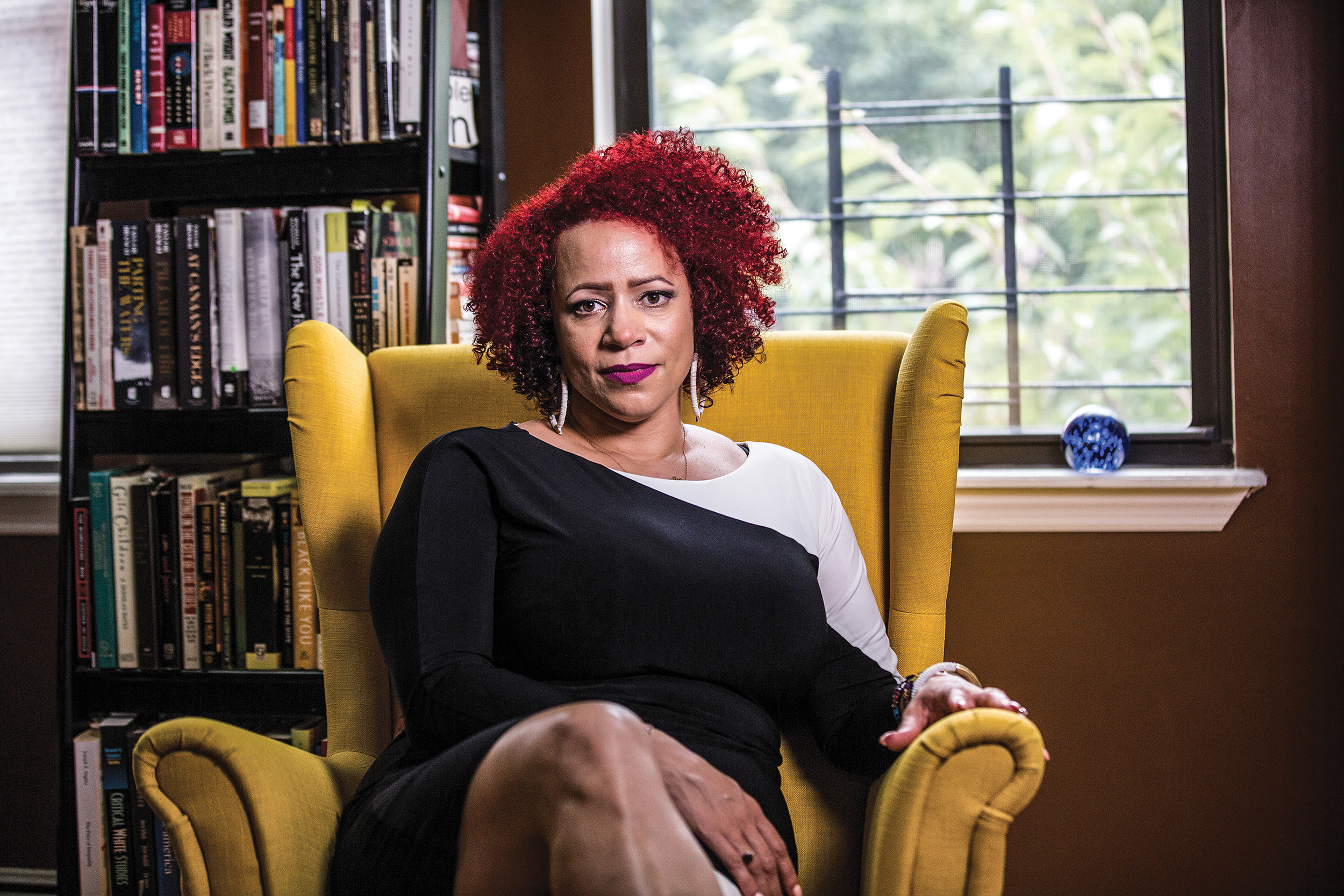Trustees Accept Resubmission of Hannah-Jones Tenure Bid
Posted on May 27, 2021
Nikole Hannah-Jones ’03 (MA). (John D. & Catherine T. MacArthur Foundation)
The possibility of Nikole Hannah-Jones ’03 (MA) receiving a tenured faculty position in UNC’s Hussman School of Journalism and Media is back on the table.
Members of the Board of Trustees, including the chair of the University Affairs Committee to which tenure applications go first, say the request to grant tenure to Hannah-Jones has been resubmitted by the faculty committee that considers tenure.
The resubmission comes amid a recent steady stream of criticism of the trustees’ refusal to grant Hannah-Jones tenure in a process that began last summer.
On Wednesday, the chancellor’s Commission on History, Race and a Way Forward — set up to guide UNC’s reckoning with its racial history — joined “others in the Carolina community who have called you to account for refusing to review the faculty recommendation that Nikole Hannah-Jones be appointed Knight professor of journalism, with tenure.”
“Intentionally or not,” the commission co-chairs wrote to the trustees, “you have enlisted the university in the project of historical denialism that refuses to confront the centrality of race and racism in our national past and in the life of our nation, state, and university today. In the absence of any measure of transparency, you leave us with deeply disturbing facts.
“You denied a Black woman tenure after a rigorous review by Carolina faculty and external academic evaluators. Prior appointees to the Knight chair at UNC were white and were awarded tenure. Your claim that Hannah-Jones should be treated differently because she comes from outside the academy does not bear scrutiny.” Members of the commission signed the letter.
Hannah-Jones, a 2020 Pulitzer Prize winner for her “1619 Project” for The New York Times and recipient of a MacArthur Fellowship “genius grant” in 2017, sailed through the lengthy tenure approval process. She then was awarded a Knight Chair in race and investigative journalism by the John S. and James L. Knight Foundation; the endowment is designed to bring top professionals to classrooms to teach and mentor students. After the application for tenure reached the provost’s office, where a request in January from the trustees’ University Affairs Committee for more time to consider it was granted, the application never reached the full Board of Trustees.

Stevens
On May 20, trustees Chair Richard Stevens ’70 (’74 MPA, ’74 JD) explained that University Affairs Chair Charles Duckett ’82 had questioned the provost — the last person to see tenures packages before they go to the trustees — about the application and had asked for more time to consider it. Therefore, Stevens said, “neither the provost nor the chancellor ever presented any recommendation on the appointment to the board, nor did the board take any action on this appointment. We took no action on this appointment.”

Chapman
Faculty Chair Mimi Chapman ’97 (PhD) took issue: “If her name had never gone over, then Chair Duckett, how would he know to ask the question?”

Duckett
Duckett told the media this week that he had not seen Hannah-Jones’ tenure materials before this week. He told the media that he has the submission now and that he wants answers to some questions, including Hannah-Jones’ classroom teaching experience, before the trustees reconsider. He said there was no timeline for the trustees to act.
In the meantime, Hannah-Jones has been granted a five-year fixed term professorship that does not require the trustees’ approval.
UNC Media Relations repeatedly has said South Building administrators would have no comment on the matter, citing privacy for personnel issues.
On Wednesday, UNC System President Peter Hans ’91 and the system’s Board of Governors Chair Randy Ramsey said it was not the system’s place to intervene in this trustees’ matter.
Hannah-Jones has been a lightning rod in Chapel Hill, drawing the attention of conservatives who see her as an advocate of the racial reckoning movement. Writers for the James G. Martin Center for Academic Renewal referred to her as “the founder of the infamous 1619 Project, which seeks to reframe American history as fundamentally racist” and said her hiring “signals a degradation of journalistic standards.” Those writers also opined: “In determining whether or not to approve a hire, the board must consider whether the individual prioritizes scholarship over political activism.”
“The 1619 Project,” named for the year that enslaved Black people first landed on American shores, is in the Times’ words an attempt “to reframe the country’s history by placing the consequences of slavery and the contributions of Black Americans at the very center of the United States’ national narrative.” It was Hannah-Jones’ idea, and her Pulitzer was for its introductory commentary.
Historians, journalists and Times staff debated some of the material and questioned its accuracy. The paper added editing of the story and published clarifications but stood by the project.
In its letter, the Commission on History, Race and a Way Forward stated that two of Hannah-Jones’ sharpest critics — Sean Wilentz and Keith Whittington, both chaired professors at Princeton University — wrote in The Chronicle of Higher Education on May 25 that “[w]e have been critical of Hannah-Jones’ best-known work in connection with ‘The 1619 Project,’ and we remain critical. We also respect the judgment and the authority of the University of North Carolina’s faculty and administration. For the Board of Trustees to interfere unilaterally on blatantly political grounds is an attack on the integrity of the very institution it oversees.”
Thirty-five Hussman faculty members said in a letter that they were “stunned,” and 31 student leaders wrote to Hannah-Jones that they were “frustrated and disappointed that our University, the flagship institution of the UNC System, has failed not only you, an outstanding alumna, but its students, its faculty, its community as a whole — and yes, the spirit upon which Carolina was founded: Lux Libertas — light and liberty.”
Thirty-five Hussman faculty members said in a letter that they were “stunned,” and 31 student leaders wrote to Hannah-Jones that they were “frustrated and disappointed that our University, the flagship institution of the UNC System, has failed not only you, an outstanding alumna, but its students, its faculty, its community as a whole — and yes, the spirit upon which Carolina was founded: Lux Libertas — light and liberty.”
The Carolina Black Caucus, an advocacy group for Black UNC faculty and staff, wrote, “The decision to back out of offering Hannah-Jones tenure with her appointment is yet another example of UNC’s lack of commitment to ensuring that our Black student population sees themselves in their instructional faculty.” The trustees’ May 20 meeting was interrupted by people protesting the decision. Twenty-one Knight Chair holders from across the country and the National Association of Black Journalists announced their opposition.
On Monday, the Faculty Executive Committee adopted a resolution urging the trustees to “uphold the long tradition of respect for recommendations from faculty bodies in hiring and tenure cases.” The committee asked the trustees to “take up the matter of tenure for Nikole Hannah-Jones immediately, and to explain to the fullest extent possible, without violating the law, the reasons for its decision.”
The new student body president, Lamar Richards, a member of the Board of Trustees by virtue of his office, has demanded that the board consider her tenure.
Hannah-Jones began her career as an education reporter with The Chapel Hill News and then The News & Observer, where her coverage of school equity and the racial achievement gap in the Durham public school system led to school board action to improve education access and quality. She then worked as an enterprise reporter at The Oregonian before becoming an investigative reporter covering civil rights, discrimination, housing and school segregation at ProPublica. She joined The New York Times in 2015.
Among her national honors are the National Association of Black Journalists’ Journalist of the Year Award in 2015; Peabody and Polk awards for radio reporting in 2016; the Hillman Prize for magazine reporting and the National Magazine Award in 2017 and again in 2020; the MacArthur Fellowship in 2017; Columbia University’s John Chancellor Award for Distinguished Journalism in 2018; and a second Journalist of the Year Award in 2019. The Society of American Historians welcomed her as a fellow in 2020. On April 9, she was inducted into the N.C. Media and Journalism Hall of Fame.
She received the GAA’s Distinguished Young Alumni Award in 2017, and she was profiled in “Schools of Choice” in the Carolina Alumni Review in March/April 2019.
